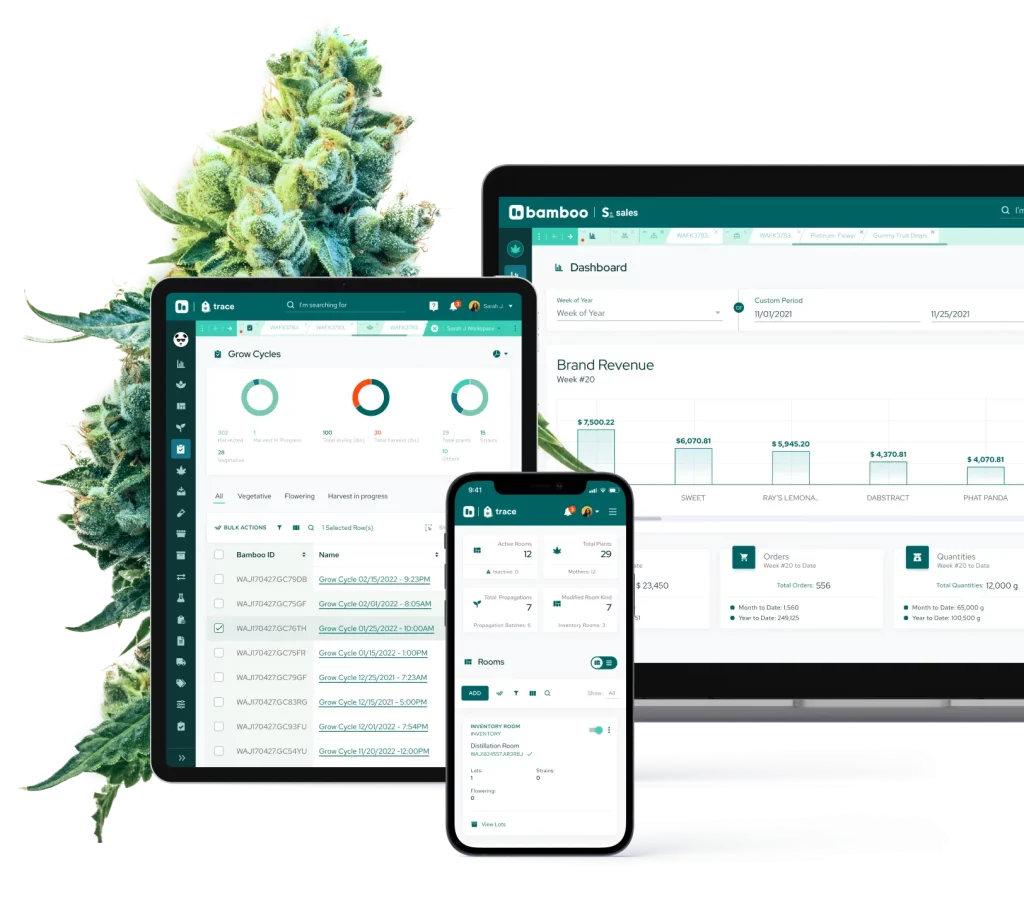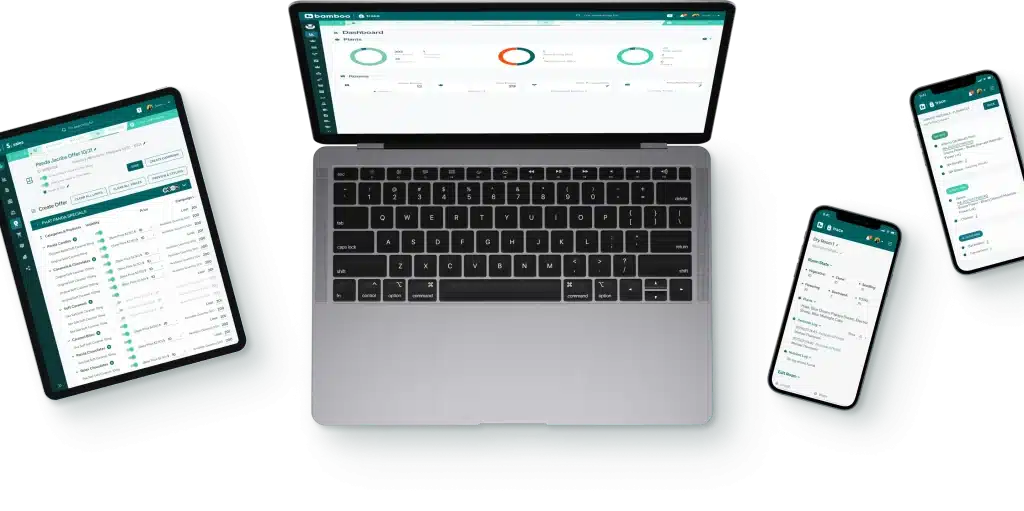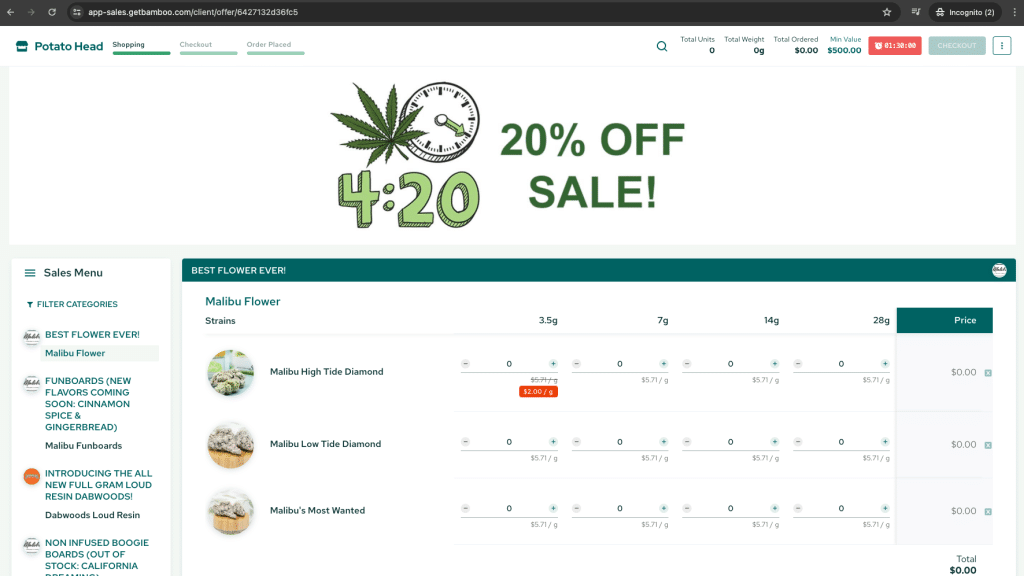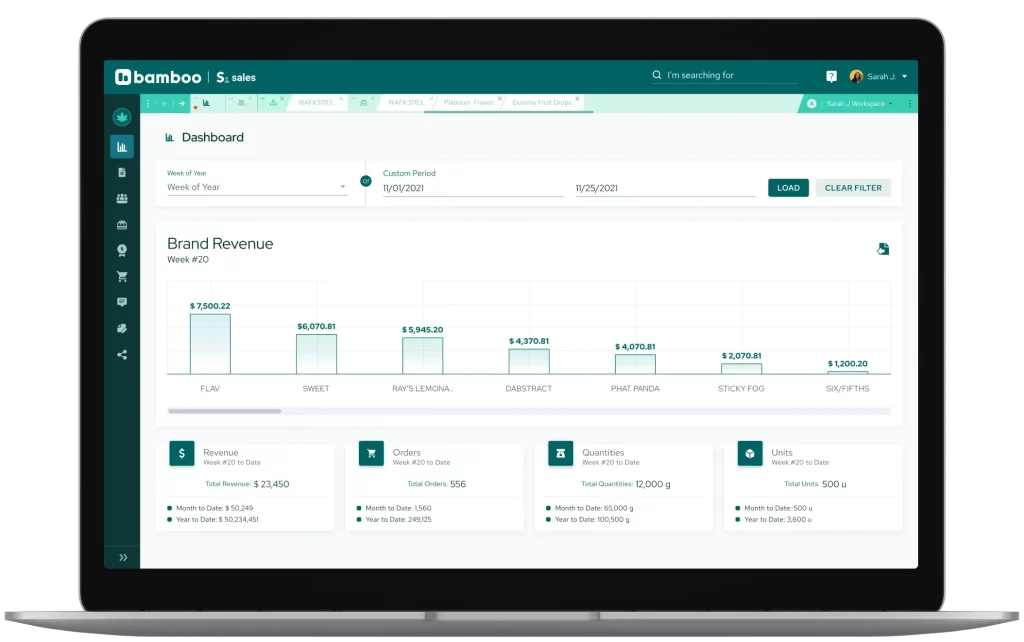Nevada Seed to Sale Cannabis Software
Bamboo provides essential software solutions customized for Nevada’s cannabis industry, assisting businesses in streamlining operations, improving traceability, and optimizing sales strategies.
With Bamboo Sales and Trace, Nevada cannabis businesses effectively manage inventory, ensure compliance with Nevada state regulations, and accelerate revenue potential. With features like real-time inventory tracking, customizable sales menus, and integrated compliance reporting, Bamboo empowers businesses to succeed and grow within the Nevada cannabis industry.

Nevada's Recreational Market
Nevada’s recreational cannabis market has continued to thrive and mature, building on its success since the state legalized adult-use sales in 2017. Here’s an overview of some key developments:
- Sales and revenue:
- According to the Nevada Cannabis Compliance Board, total adult-use cannabis sales for the 2023 calendar year reached approximately $1.2 billion, a 15% increase from the previous year.
- The state collected around $120 million in cannabis tax revenue, which is allocated to various programs, including education, public safety, and marijuana regulation.
- Market trends:
- Nevada’s market has been heavily influenced by its tourism industry, with a significant portion of sales coming from out-of-state visitors.
- The state has seen a growing demand for premium and luxury cannabis products, with many brands offering high-end edibles, concentrates, and accessories.
- Consumption lounges have become increasingly popular, providing tourists and locals with legal, social spaces to enjoy cannabis.
- Regulatory developments:
- In 2023, the Nevada Legislature passed a bill to streamline the cannabis business licensing process and create more opportunities for social equity applicants.
- The state also updated its testing and labeling requirements to ensure product safety and transparency, particularly for cannabis-infused edibles and beverages.
- Industry growth:
- Nevada has continued to attract significant investment in its cannabis industry, with several major acquisitions and expansions by multi-state operators.
- The state has also seen a growing number of partnerships between cannabis businesses and mainstream hospitality and entertainment brands, reflecting the industry’s increasing legitimacy and acceptance.
- Many retailers have expanded their delivery services to better serve local customers and compete with the illicit market.
- Social equity and justice:
- Nevada has taken steps to address the disproportionate impact of cannabis prohibition on certain communities, with programs to support social equity applicants and reinvest in affected neighborhoods.
- The state has also worked to expedite the expungement of past cannabis convictions and provide resources for individuals seeking to enter the legal industry.
- Challenges:
- Despite its success, Nevada’s cannabis market has faced ongoing challenges related to banking and financial services, due to the continuing federal prohibition of cannabis.
- The state has also grappled with the need to balance the interests of the cannabis industry with concerns from local communities and stakeholders, particularly in areas with high concentrations of dispensaries.
Overall, Nevada’s recreational cannabis market has demonstrated impressive resilience and growth, cementing its position as a leader in the industry. With a focus on premium products, consumption lounges, and social equity, the state has adapted to the evolving demands of consumers and the changing regulatory landscape. However, challenges related to federal prohibition, local control, and balancing industry interests with community concerns will require ongoing attention and collaboration as the market continues to mature.
Nevada's Road to Recreational Cannabis
Nevada’s journey to legalizing recreational cannabis involved a combination of legislative efforts and a successful ballot initiative. Here’s a timeline of the key events:
- 2000: Nevada voters approved Question 9, allowing for the use of medical cannabis with a doctor’s recommendation.
- 2001: The Nevada Legislature passed AB 453, establishing a state registry for medical cannabis patients and allowing for the creation of non-profit medical cannabis dispensaries.
- 2013: The Nevada Legislature passed SB 374, authorizing the creation of for-profit medical cannabis dispensaries and establishing a regulatory framework for the industry.
- 2014-2015: Efforts to legalize recreational cannabis through the legislature were unsuccessful, leading advocates to focus on a ballot initiative campaign.
- 2015: The Coalition to Regulate Marijuana Like Alcohol filed the Initiative to Regulate and Tax Marijuana (Question 2) with the Nevada Secretary of State.
- November 2016: Nevada voters approved Question 2 with 54.5% of the vote, legalizing the possession, consumption, and cultivation of cannabis for adults 21 and older.
- January 2017: Provisions of Question 2 allowing adults 21 and older to possess up to one ounce of cannabis and to cultivate up to six plants at home took effect.
- July 2017:
- The Nevada Department of Taxation, tasked with regulating the adult-use cannabis industry, adopted temporary regulations allowing for early retail sales through existing medical cannabis dispensaries.
- The first recreational cannabis sales began on July 1, just eight months after the passage of Question 2.
- 2018-2023:
- Nevada’s adult-use cannabis industry has experienced rapid growth, with sales surpassing expectations and generating significant tax revenue for the state.
- The Department of Taxation has continued to refine and update regulations for the industry, addressing issues such as packaging, labeling, and product testing.
- Cannabis tax revenue has been allocated to education, public safety, and drug treatment programs.
Nevada’s swift implementation of recreational cannabis sales and its success in establishing a well-regulated industry can be attributed to several factors, including the state’s experience with medical cannabis, a streamlined regulatory process, and strong public support for legalization. As the state’s adult-use market continues to mature, Nevada serves as an example of the potential economic benefits and regulatory best practices associated with a legal cannabis industry.
Traceability, Compliance & Regulation in Nevada
Nevada selected Metrc for their seed-to-sale compliance system due to several factors. Firstly, Metrc is widely recognized as a leader in cannabis tracking and compliance solutions, having been implemented successfully in various states across the United States. Its established track record and reliability likely played a significant role in Nevada’s decision.
Furthermore, Metrc’s ability to provide real-time monitoring and oversight of cannabis operations appealed to Nevada regulators. The system’s transparency and accountability help prevent diversion and ensure that cannabis products are handled and tracked in accordance with state laws and regulations.
Overall, Nevada’s decision to choose Metrc for their seed-to-sale compliance system was likely influenced by the company’s reputation, comprehensive features, and proven track record in the cannabis industry.
- Traceability:
- Nevada uses the METRC (Marijuana Enforcement Tracking Reporting Compliance) system for seed-to-sale tracking of cannabis products.
- All licensed cannabis businesses must use METRC to track their inventory, transfers, and sales.
- Each plant and product package is assigned a unique identifier tag, enabling detailed tracking throughout the supply chain.
- Compliance:
- Cannabis businesses must adhere to strict regulations set by the CCB, including security requirements, inventory tracking, product testing, packaging, and labeling standards.
- Dispensaries must verify customer age and adhere to purchase limits to ensure compliance with state laws.
- Licensees must maintain accurate records and report their activities through the METRC system.
- Regulation:
- The CCB is responsible for licensing and regulating cannabis businesses, including cultivators, manufacturers, distributors, testing laboratories, and retailers.
- The agency sets rules for product safety, security, advertising, and marketing to protect public health and prevent access by minors.
- The CCB conducts inspections and investigations to ensure licensees comply with state regulations.
- Testing:
- All cannabis products must undergo rigorous testing by CCB-licensed laboratories before being sold to consumers.
- Testing includes analyzing potency, pesticides, microbial impurities, and other contaminants to ensure product safety and quality.
- Test results are recorded in the METRC system, and only compliant products are allowed to enter the market.
- Taxation:
- Nevada imposes an excise tax on the sale of cannabis products, which varies depending on the type of product and the stage of the supply chain.
- Cannabis businesses must also pay sales tax and obtain the necessary permits and licenses from local jurisdictions.
- Enforcement:
- The CCB has the authority to conduct investigations, issue fines, and suspend or revoke licenses for non-compliance with state regulations.
- The agency works with local law enforcement to combat the illicit cannabis market and prevent diversion of legal products.
Here are some key aspects of Nevada’s approach:
- Licensing:
- The CCB issues licenses for cannabis cultivation, production, distribution, testing, and retail facilities.
- Applicants must meet strict requirements related to security, operations, and financial stability.
- The state has implemented social equity provisions to promote diversity and inclusion in the industry.
- Seed-to-sale tracking:
- All licensed cannabis businesses must use the state’s seed-to-sale tracking system, Metrc, to monitor the movement of cannabis products from cultivation to sale.
- This system helps prevent diversion to the illicit market, ensures products are coming from licensed sources, and enables product recalls if necessary.
- Testing and safety:
- All cannabis products must be tested by licensed laboratories for potency, purity, and contaminants before being sold to consumers.
- Products must be properly packaged in child-resistant containers and labeled with warnings and information about content and potency.
- Strict manufacturing standards are in place to ensure product safety and consistency.
- Advertising and marketing:
- There are significant restrictions on cannabis advertising to prevent appeal to minors and promote responsible consumption.
- Advertising cannot depict actual consumption, make unproven health claims, or be placed in media with a high youth audience.
- Marketing must include necessary warning statements.
- Consumption lounges:
- In 2021, Nevada legalized cannabis consumption lounges, allowing for on-site consumption of cannabis products at licensed venues.
- These lounges are subject to additional regulations to ensure safety and prevent overconsumption.
- Taxes and revenue:
- Adult-use cannabis sales are subject to a 10% excise tax and the regular state sales tax.
- A portion of the tax revenue is allocated to education, drug treatment, and law enforcement programs.
The CCB conducts regular inspections and audits to ensure licensed businesses are complying with all regulations. Penalties for non-compliance can include fines, license suspensions, or revocation. The state also has a robust inventory tracking system to prevent diversion and maintain product traceability.
Nevada’s approach to cannabis regulation prioritizes public health and safety while also promoting a well-regulated and economically viable industry. The state continues to refine its policies based on emerging best practices and the evolving needs of consumers and businesses.
Why Bamboo for Nevada?
Are you tired of dealing with platforms like Leaflink, Metrc, Distru, and others? Bamboo offers seamless integration with Metrc, providing a two-way sync for your convenience. With Bamboo, you can effortlessly create all your traceability and product labels. Best of all, Bamboo Trace is complimentary for all Nevada Metrc users, ensuring effortless and seamless traceability alongside integrated Bamboo Sales.
Many businesses are now adopting Bamboo’s proactive sales strategies, which include user-friendly menus for easy ordering on both desktop and mobile devices. Our sales menu website integration is simple to set up and adds an additional revenue stream. Furthermore, Bamboo enables you to generate as many recommended orders as you need (buyers love it when reps do the work for them)! Bamboo Sales also offers robust data analytics with customizable reporting and much more!
It’s time to take your operations to the next level with Bamboo.
Bamboo Trace
✔ Quick-action buttons available in every module for swift navigation and action execution.
✔ Simplified traceability through real-time two-way synchronization with Nevada’s seed-to-sale system (Metrc).
✔ Receive instant notifications for important updates and events.
✔ Work in offline mode, accessible on both mobile and desktop devices, especially useful during periods of downtime in Metrc API systems.
✔ Ability to support multiple licenses for comprehensive management of operations.
✔ Customize label templates to meet Nevada’s Metrc regulations and efficiently generate multiple labels for various plant and product requirements.
✔ Comprehensive management of Strains, Rooms, Propagations, Grow Cycles, Plants, Harvests, Disposals, Inventories, Conversions, QA Samples, and more, all integrated within Bamboo Trace.
✔ Effortlessly process orders and generate manifests in just minutes for enhanced efficiency.

Bamboo Sales
✔ Utilize the finest Sales Menus available in Cannatech for enhanced sales strategies.
✔ Seamlessly integrate Sales Menus with your website for expanded reach and accessibility.
✔ Simplify email marketing efforts with the built-in feature tailored for sending sales menus effortlessly.
✔ Gain insights through comprehensive sales analytics and reporting on clients, sales reps, and customizable metrics.
✔ Generate numerous recommended orders (proposals) to cater to diverse client needs.
✔ Customize Real-time Sales Menus according to preferences and branding.
✔ Easily manage discounts, credits, pricing tiers, and distribution lists for streamlined operations.
✔ Efficiently handle all your sales enablement strategies within the Bamboo Sales platform.

